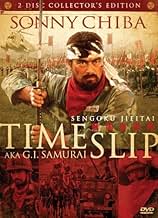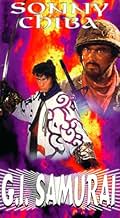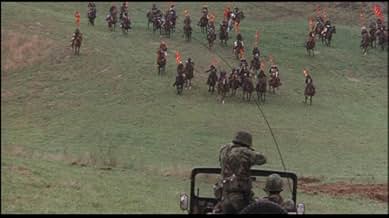IMDb-BEWERTUNG
6,4/10
1246
IHRE BEWERTUNG
Füge eine Handlung in deiner Sprache hinzuJapanese soldiers time travel to feudal era. Their lieutenant allies with samurai lord to become Shogun. Both seek power through different eras' warfare.Japanese soldiers time travel to feudal era. Their lieutenant allies with samurai lord to become Shogun. Both seek power through different eras' warfare.Japanese soldiers time travel to feudal era. Their lieutenant allies with samurai lord to become Shogun. Both seek power through different eras' warfare.
- Auszeichnungen
- 3 Nominierungen insgesamt
Shin'ichi Chiba
- Lt. Yoshiaki Iba
- (as Sonny Chiba)
Empfohlene Bewertungen
I would firstly say that somehow I remember seeing this movie in my early childhood, I couldn't read the subtitles and I thought Sonny Chiba was Sean Connery. But I did really like the concept. If you are not able to at least partially suspend your adult scepticism and embrace your inner seven your old you may want to avoid this movie. That said, having just watched the restored 137 minute version on DVD I have to say I enjoyed it, though not as much as when I was seven ( I remembered the ending ).
There are aspects of the movie that are worthy of criticism , the first 15 minutes and final 15 minutes both have some really comic moments, my favourite being the contrast between scenes acted out in the final 10 minutes and the curious choice of backing music ( listen to the lyrics ).
For an action film there is a great deal of focus on the personal stories of certain soldiers and the social dynamics of the squad as the strain of their time travel takes its toll. By the ending of the movie I had decided that this was a good thing, when seven I though the 'relationship' guff was a bad thing.
For an action film there is also plenty of gratifying gory action, especially a couple of epic battle scenes between the platoon and hordes of Shogun era warriors. The makers of the movie have ensured that as many deaths as possible are bloody and, lets face it, humorous. I thought this was a splendid aspect of the movie when I was a kid, and I am not ashamed to say that I still do.
I also like the fact that the modern day soldiers in general don't spend the movie walking on egg shells trying to avoid altering the space time continuum, they've got heavy calibre machine guns, mortars, rocket launchers, a tank and a helicopter and they're hell bent on making feudal Japan theirs. Which is what I'd like to think any vigorous IMDb user would do in their boots.
In short the movies worth watching, it makes the viewer regret that there are not more movies made with a similar premise, and at the same time offers some hefty hints as to why a movie like G.I. Samurai is so unique.
There are aspects of the movie that are worthy of criticism , the first 15 minutes and final 15 minutes both have some really comic moments, my favourite being the contrast between scenes acted out in the final 10 minutes and the curious choice of backing music ( listen to the lyrics ).
For an action film there is a great deal of focus on the personal stories of certain soldiers and the social dynamics of the squad as the strain of their time travel takes its toll. By the ending of the movie I had decided that this was a good thing, when seven I though the 'relationship' guff was a bad thing.
For an action film there is also plenty of gratifying gory action, especially a couple of epic battle scenes between the platoon and hordes of Shogun era warriors. The makers of the movie have ensured that as many deaths as possible are bloody and, lets face it, humorous. I thought this was a splendid aspect of the movie when I was a kid, and I am not ashamed to say that I still do.
I also like the fact that the modern day soldiers in general don't spend the movie walking on egg shells trying to avoid altering the space time continuum, they've got heavy calibre machine guns, mortars, rocket launchers, a tank and a helicopter and they're hell bent on making feudal Japan theirs. Which is what I'd like to think any vigorous IMDb user would do in their boots.
In short the movies worth watching, it makes the viewer regret that there are not more movies made with a similar premise, and at the same time offers some hefty hints as to why a movie like G.I. Samurai is so unique.
High concept movies don't get much higher in concept than G. I. Samurai, which is about a group of military personnel and their equipment getting transported back in time 100s of years, to samurai times. Once there, they get involved in a great many battles and ridiculous action ensues, especially for what feels like most of the second half.
At 140 minutes, I feel like it's way too long. There are also some uncomfortable/awkward moments here and there that soured things a little. But at the same time, I enjoyed quite a lot of it, and I liked how gonzo it was. It found a good deal of things to do with the wild premise at hand, and in that way, it definitely didn't feel like a waste or a missed opportunity.
At 140 minutes, I feel like it's way too long. There are also some uncomfortable/awkward moments here and there that soured things a little. But at the same time, I enjoyed quite a lot of it, and I liked how gonzo it was. It found a good deal of things to do with the wild premise at hand, and in that way, it definitely didn't feel like a waste or a missed opportunity.
"Who is Sonny Chiba? He is... he is bar none, the greatest actor working in martial arts movies today". So explains Clarence Worley in True Romance, a man who clearly knows his shizzle when it comes to Asian action stars. G.I. Samurai is the third flick I've seen from the dirt-cheap, 4-film Chiba box-set I bought from ebay, and it's the third winner in a row, a hugely entertaining sci-fi tinged action/adventure that ploughs through its 139 minutes like a 50-calibre machine gun through an army of warring-era Japanese soldiers.
Chiba plays Lt. Yoshiaki Iba, leader of a Japan Ground Self-Defense Force squadron that 'slips' through time, arriving in feudal Japan, where they join forces with a power hungry samurai planning to become the country's next ruler. The script doesn't concern itself with the whys and wherefores of the squadron's predicament, quickly glossing over the time travel nonsense in order to concentrate on the job at hand: pitting the modern-day soldiers, with their powerful weaponry, against hordes of warriors armed with swords, arrows, spears and throwing stars (oh yes, there will be ninjas!).
A couple of quieter moments do allow for that other all important staple of exploitative Japanese cinema—gratuitous female nudity—as several of Iba's men go AWOL for a rape and pillage spree, while a few others pay a visit to an obliging local widower; for the most part, however, it's loud, relentless, and bloody stuff, with Chiba proving Clarence to be right on the money with his assessment of the star: whether suspended from a helicopter firing a machine gun, riding a horse while firing a bow and arrow, or taking on a warlord with a broken sword, Sonny kicks serious ass.
Chiba plays Lt. Yoshiaki Iba, leader of a Japan Ground Self-Defense Force squadron that 'slips' through time, arriving in feudal Japan, where they join forces with a power hungry samurai planning to become the country's next ruler. The script doesn't concern itself with the whys and wherefores of the squadron's predicament, quickly glossing over the time travel nonsense in order to concentrate on the job at hand: pitting the modern-day soldiers, with their powerful weaponry, against hordes of warriors armed with swords, arrows, spears and throwing stars (oh yes, there will be ninjas!).
A couple of quieter moments do allow for that other all important staple of exploitative Japanese cinema—gratuitous female nudity—as several of Iba's men go AWOL for a rape and pillage spree, while a few others pay a visit to an obliging local widower; for the most part, however, it's loud, relentless, and bloody stuff, with Chiba proving Clarence to be right on the money with his assessment of the star: whether suspended from a helicopter firing a machine gun, riding a horse while firing a bow and arrow, or taking on a warlord with a broken sword, Sonny kicks serious ass.
What if a platoon of G.I.'s from the Japanese army were to be send back in time 400 years right in the middle of the feudal wars that led to the formation of the Tokugawa Shogunate? Great pitch right? The movie does exactly what it says on the tin.
Thankfully the writers didn't bother to explain the, usually ridiculous in sci-fi movies, scientific mumbo jumbo of time transport. No how's or why's. They just did. However the time transport sequence itself is trippy as hell and quite beautiful, if not a bit dated. Not as silly as one would imagine.
The rest of the movie follows the premise to a T. But while it loses a bit of steam with the various subplots that follow the G.I.s arrival to medieval Japan, it picks up with a devastating battle sequence. Undoubtedly it's the main order of the day. The whole concept and by extension the movie itself, was probably originated from this simple pitch: what if G.I.'s equipped with the latest in modern warfare were to fight samurais? And boy does it deliver.
The main battle sequence that spans more than half an hour is probably one of THE best of its kind in 70's action/war movies. Not only is it relentless and exhausting in pace and length, it's also a terrific mish-mash of styles and techniques that only unique premises like G.I. Samurai can deliver. I mean, where else would you get the chance to feature tanks, ninjas complete with shuriikens, a helicopter and samurais in the same shot? The G.I. platoon led by lieutenant Iba tears literally through hundreds of extras, gunning them down with machine guns, mortars, grenades and tanks.
This mish-mash of styles is with one foot firmly rooted in the sprawling jidai-geki epic of Kurosawa's Kagemusha or Hiroshi Inagaki's Samurai Banners, while the other is in western action and war movies. There are stylistic touches (like the wonderful slow-motion shots and bloody violence) that bring Sam Peckinpah or Enzo G. Castellari circa Keoma to mind. Japanese cinema has always been influenced by westerns and other Hollywood works and vice versa, and G.I. Samurai effortlessly turns this east-meets-west melting pot into an exciting film.
The film-makers thankfully take the whole thing seriously and the movie benefits immensely from it. Not that tongue-in-cheek mentality is completely absent, it's just that it doesn't try to pander to so-bad-it's-good audiences that enjoy laughing at their movies. The budget was probably hefty, as it is evident in the hundreds of extras, elaborate costumes (very decent for a production that is not a traditional jidai-geki) and special effects. The camera-work and editing are all top notch, almost better than a movie with no higher artistic ambitions deserves.
It's not withouts its flaws either of course. There are many "song" scenes, where all sorts of 70's Japanese rock, disco and country songs play over montages (there's a bonding scene, a love-interest scene, a "war is hell" scene etc). The songs themselves are pretty lame and corny and detract from the whole thing. Although it clocks at a whooping 140 minutes, it flies like a bullet for the most part. Still some scenes, flashbacks and subplots in the first half could have been clipped for a tighter effect.
The cast also deserves a mention, featuring such prominent names as Sonny Chiba, Isao Natsuyagi (Goyokin, Samurai Wolf), Tsunehiko Watase (The Yakuza Papers) and Hiroyuki Sanada, all of them hitting the right notes.
Thankfully the writers didn't bother to explain the, usually ridiculous in sci-fi movies, scientific mumbo jumbo of time transport. No how's or why's. They just did. However the time transport sequence itself is trippy as hell and quite beautiful, if not a bit dated. Not as silly as one would imagine.
The rest of the movie follows the premise to a T. But while it loses a bit of steam with the various subplots that follow the G.I.s arrival to medieval Japan, it picks up with a devastating battle sequence. Undoubtedly it's the main order of the day. The whole concept and by extension the movie itself, was probably originated from this simple pitch: what if G.I.'s equipped with the latest in modern warfare were to fight samurais? And boy does it deliver.
The main battle sequence that spans more than half an hour is probably one of THE best of its kind in 70's action/war movies. Not only is it relentless and exhausting in pace and length, it's also a terrific mish-mash of styles and techniques that only unique premises like G.I. Samurai can deliver. I mean, where else would you get the chance to feature tanks, ninjas complete with shuriikens, a helicopter and samurais in the same shot? The G.I. platoon led by lieutenant Iba tears literally through hundreds of extras, gunning them down with machine guns, mortars, grenades and tanks.
This mish-mash of styles is with one foot firmly rooted in the sprawling jidai-geki epic of Kurosawa's Kagemusha or Hiroshi Inagaki's Samurai Banners, while the other is in western action and war movies. There are stylistic touches (like the wonderful slow-motion shots and bloody violence) that bring Sam Peckinpah or Enzo G. Castellari circa Keoma to mind. Japanese cinema has always been influenced by westerns and other Hollywood works and vice versa, and G.I. Samurai effortlessly turns this east-meets-west melting pot into an exciting film.
The film-makers thankfully take the whole thing seriously and the movie benefits immensely from it. Not that tongue-in-cheek mentality is completely absent, it's just that it doesn't try to pander to so-bad-it's-good audiences that enjoy laughing at their movies. The budget was probably hefty, as it is evident in the hundreds of extras, elaborate costumes (very decent for a production that is not a traditional jidai-geki) and special effects. The camera-work and editing are all top notch, almost better than a movie with no higher artistic ambitions deserves.
It's not withouts its flaws either of course. There are many "song" scenes, where all sorts of 70's Japanese rock, disco and country songs play over montages (there's a bonding scene, a love-interest scene, a "war is hell" scene etc). The songs themselves are pretty lame and corny and detract from the whole thing. Although it clocks at a whooping 140 minutes, it flies like a bullet for the most part. Still some scenes, flashbacks and subplots in the first half could have been clipped for a tighter effect.
The cast also deserves a mention, featuring such prominent names as Sonny Chiba, Isao Natsuyagi (Goyokin, Samurai Wolf), Tsunehiko Watase (The Yakuza Papers) and Hiroyuki Sanada, all of them hitting the right notes.
I have a pre-cert copy of this film, which is under the title 'time wars' and it runs at an even shorter time than the 110mins version mentioned here by other users. My copy barely hits 60 mins and the hacked editing shows in a very obvious way. There is little explanation of what is going on; the prostitute from the past seems to be still working at the brothel in the late 1970s; a Samurai appears riding a horse down the street in the 1970s for NO reason and while the ending is reminiscent of Macbeth there is a much a much stronger feeling of MacDuff to the whole finished product. I would like to see an unedited version of this in relation to what people are saying about it as my memory of it is as an instigator of Family arguments
BO!
BO!
Wusstest du schon
- WissenswertesInitially the producers approached the Japan Ground Self-Defense Force (JGSDF) for props and vehicles, but the army withdrew its support after reading that soldiers go AWOL in the script. For that reason, old and sometimes outdated equipment (like M3 sub-machine guns) had to be used. The tank featured in the movie was even built entirely from scratch.
- PatzerNone of the vehicles run out of fuel despite being stranded 400 years before the creation of fossil fuels for weeks.
- Alternative VersionenInternational English language version has rock ballads replacing original haunting soundtrack.
- VerbindungenReferenced in Maniac 2 - Love to Kill (1982)
Top-Auswahl
Melde dich zum Bewerten an und greife auf die Watchlist für personalisierte Empfehlungen zu.
- How long is I Want To?Powered by Alexa
Details
Zu dieser Seite beitragen
Bearbeitung vorschlagen oder fehlenden Inhalt hinzufügen
























